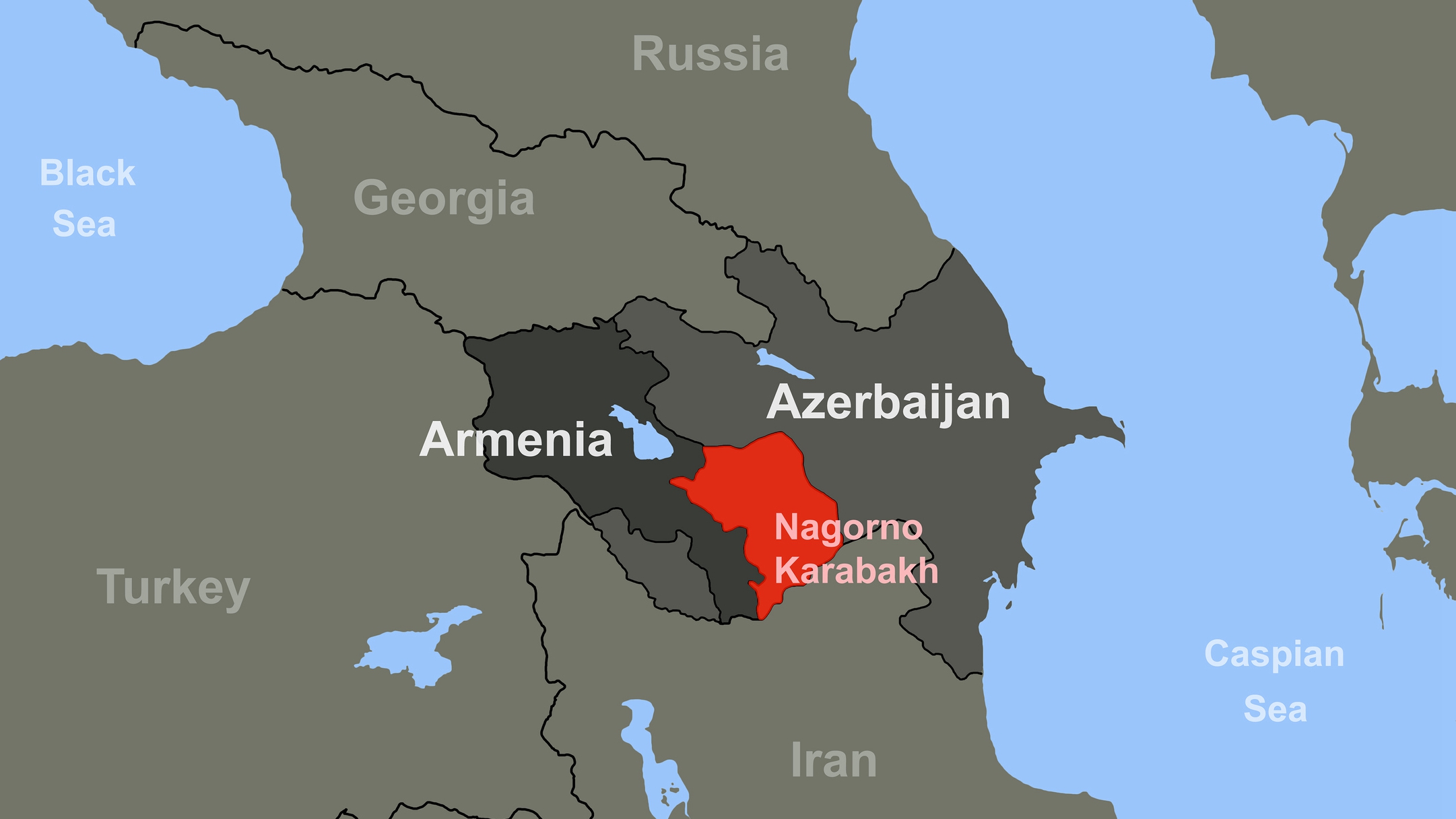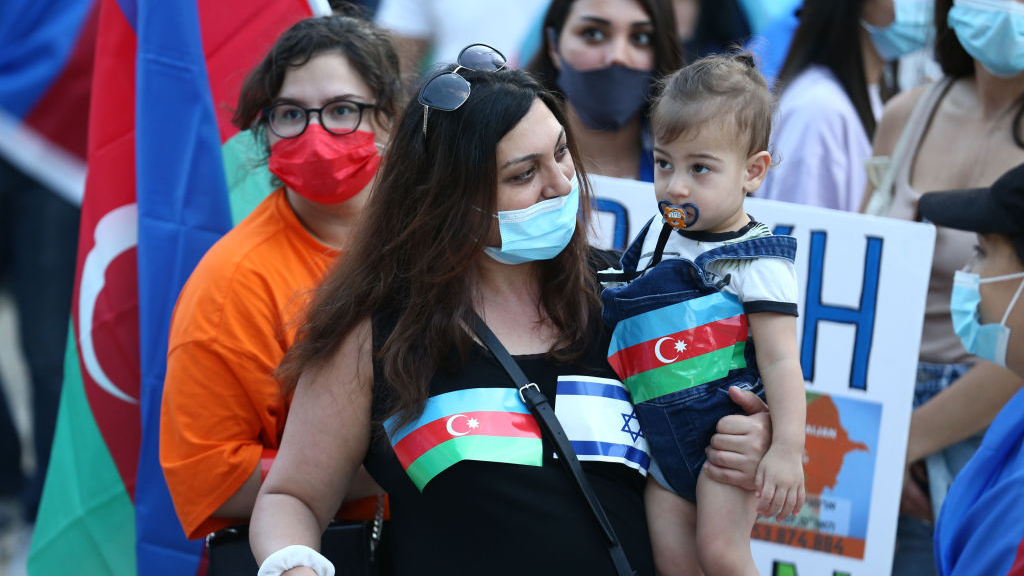
Armenia-Azerbaijan conflict in Nagorno-Karabakh on outline geographic map. /Getty Images
Armenia-Azerbaijan conflict in Nagorno-Karabakh on outline geographic map. /Getty Images
Editor's note: Guy Burton is an adjunct professor at Vesalius College, Brussels. The article reflects the author's opinions and not necessarily the views of CGTN.
Should we start thinking about the recent eruption of fighting between Armenia and Azerbaijan as part of the wider Middle East region? If so, what are the reasons behind doing so and what could be the potential future implications associated with this idea?
Until recently, I viewed the conflict as only the latest round of hostilities between two countries on the edge of Europe whose differences date back more than a century. At its heart is a dispute between two national groups over territory. Those differences were largely frozen following the absorption of the two countries into the Soviet Union. But the end of the Cold War and the nationalist fragmentation which followed resulted in a war between newly independent Armenia and Azerbaijan over that territory and around 30,000 people.
As the successor state of the Soviet Union, Russia considered the Caucasus within its sphere of influence and brokered a ceasefire in 1994. But it was not able to impose a lasting peace, leading to uneasiness, punctuated by the occasional fighting.
What makes the current round of fighting different from before is the presence of parties from the Middle East, which may have consequences for the future of the conflict.
First, is the more active role and backing that Turkey has given to Azerbaijan. While Turkey has long been a supporter of Azerbaijan and relations have been historically fraught between it and Armenia, it has previously stopped short of providing more substantive assistance. This time, Ankara has become increasingly assertive and interventionist, in a way that echoes its efforts elsewhere in the Middle East.
In Syria, Turkey shifted away from observing the chaos, which took over the country after 2011 to becoming a backer of rebel groups against Bashir al-Assad's government. It also directly intervened in the north of the country to contain Kurdish autonomy. Then at the start of this year, it dispatched military assistance to Libya's Government of National Accord. Its backing was enough to push back against the year-long military offensive mounted against it by General Khalifa Haftar and his armed forces.
A second factor is the presence of Syrian fighters in the Caucasus as reported by groups like the UK-based Syrian Observatory of Human Rights. According to them, many of these fighters were associated with the rebel groups backed by Turkey. Many of them reported that they traveled for economic reasons, believing they would work as security guards, but instead found themselves on the frontline of the fighting.
The presence of Turkey and Syrian fighters on the Azeri side has prompted reaction on the other side. Although far less organized, Lebanese Armenians have been outraged and responded by publicizing their displeasure in the media.
Others have sent financial assistance, although the amounts have been small, owing to the current financial crisis in Lebanon. Still others have gone even further than this, with some even traveling to the Caucasus to join the war effort. However, it is important not to overstate the numbers who have done so, owing to the lack of any wider organization or coordination of efforts.
The presence of parties like Turkey, Syrians and Lebanese Armenians therefore point to an emerging "Middle Easternization" of the Armenia-Azerbaijan conflict. While these elements are limited and nowhere near yet extensive, they do flag up some potential threats which the conflict parties in the Caucasus need to take note of, if they are not to be overrun in the future.
Since 2011, parts of the Middle East have been a theater for tensions and violence, which have proved detrimental for the peoples who live there and which have come from above and below.

Azerbaijani Jews hold stage a protest against Armenia's cross-border attacks on Azerbaijan in Petah Tikva, Israel, October 15, 2020. /Getty
Azerbaijani Jews hold stage a protest against Armenia's cross-border attacks on Azerbaijan in Petah Tikva, Israel, October 15, 2020. /Getty
From above, countries like Syria, Yemen and Libya have been vulnerable to the meddling of other states. They have all provided financial and military assistance to local armed groups to advance their own self-interest, which has often taken the form of financing proxy wars against each other. The impact of that behavior has been asymmetric, however, with the costs in terms of casualties and violence borne largely by those on the ground. Meanwhile, the outside parties spend just enough in financial and military support to ensure that their side is not overwhelmed and that the conflict continues.
From below, state failure and collapse in parts of the Middle East since 2011 opened the door for the emergence of new groups based on limited forms of identity and association. Some of the more extreme ones have been the most exclusionary, especially those based on religion and sect. The most notorious, the Islamic State, adopted a particularly narrow interpretation of Islam which it used to justify the abuse and violence meted out against fellow Muslims who did not fit with their distinct brand of Sunnism alongside other, non-Muslim groups.
In the case of the Armenia-Azerbaijan conflict, these pressures from above and below may be felt in similar ways. Turkey's greater activism is a clear example of foreign interference and which may encourage its regional rivals to push back through support for the other side.
Indeed, in recent years Armenia and the UAE have enhanced their diplomatic and economic ties. The current fighting potentially could well offer the UAE an open door to push for greater involvement. Were that to happen it could potentially exacerbate the conflict and suffering, and put Yerevan in a more dependent position.
Elsewhere, others from above and below may seek to exploit the religious difference between the two warring states and portray it as a struggle between Muslim Azerbaijan and Christian Armenia. Already French President Emmanuel Macron has made reference to this when he condemned Turkey's use of jihadist fighters.
So far, in the Middle East, religious leaders like the head of Al-Azhar, one of the largest and most important institutions in the Muslim world, have appealed for calm and an end to the fighting. However, that position may become tested, especially if the other, more extremist voices do not emerge and acquire influence and organization.
(If you want to contribute and have specific expertise, please contact us at opinions@cgtn.com.)